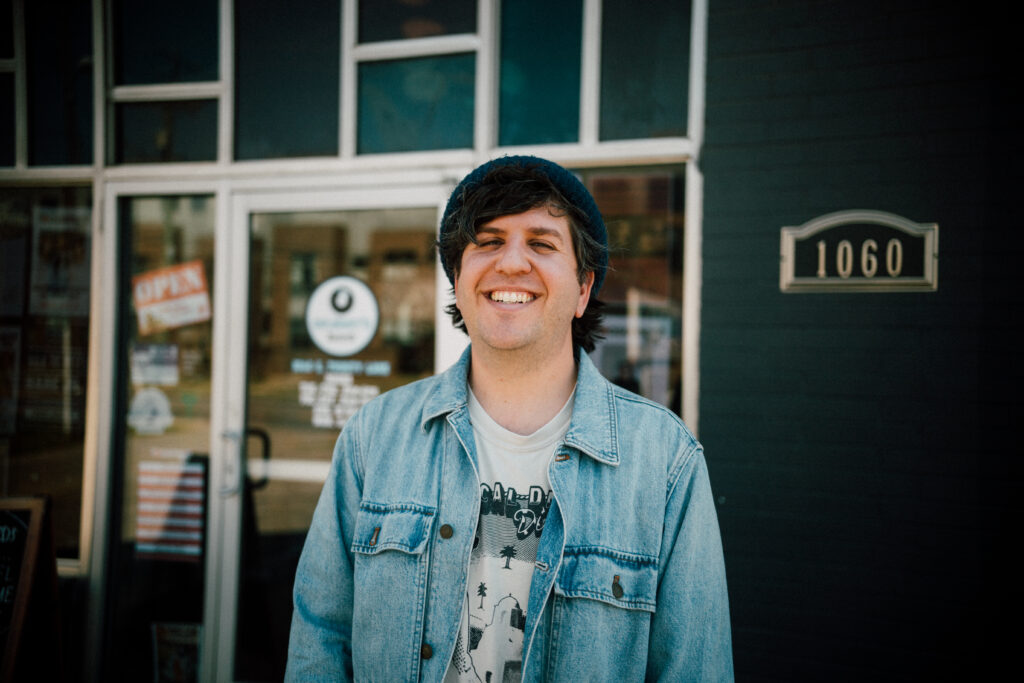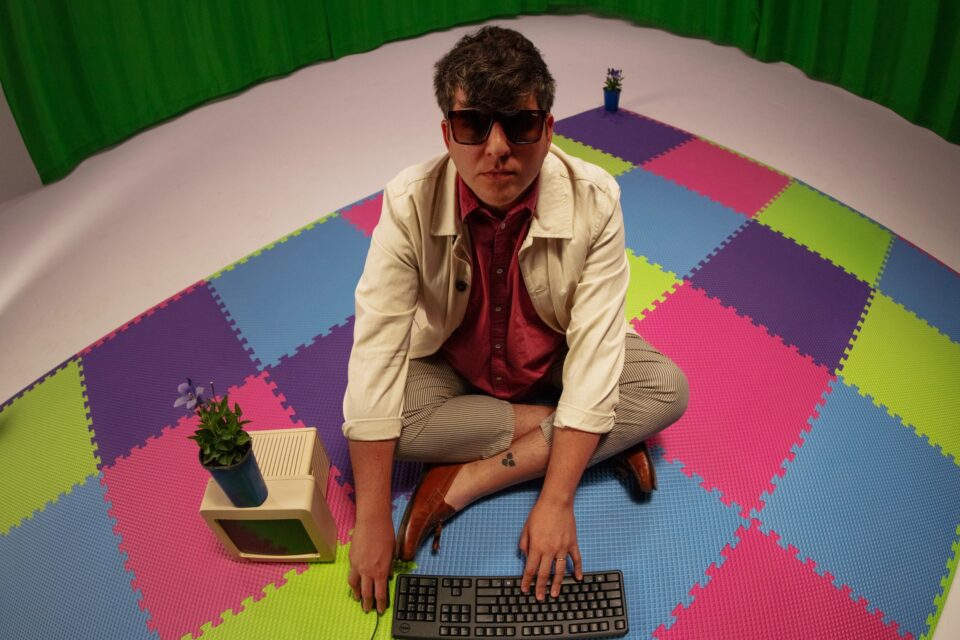Eric Slick was just one of countless artists who released a record he was really proud of and high hopes for (Wiseacre) at a very unfortunate time to release new music. The year was 2020. He couldn’t tour it, but he couldn’t quite let go, either. It was disappointing, to say the least. With a new mortgage and no touring income to count on, Slick carved out a bunch of session work as a drummer. Many indie rock fans know Slick as the man behind the kit in Philadelphia band Dr. Dog, but he’s also appeared on recent recordings by The War on Drugs, Bethany Cosentino, Robyn Hitchcock, Ruston Kelly and the album Fearless (Taylor’s Version) by another notable Middle Tennessean. He necessarily took some time before getting back to writing new music of his own, tunes that would be compiled for this new LP called New Age Rage, then really dove headlong into this project.

“This is the hardest I’ve ever worked on a record — was working on it pretty steadily for three years,” he said. “So for it to finally be out in the world is really refreshing, [that I] can actually present it to people in the way that I want to.”
Before embarking on tour for this funky, dance-y, sample-rich and obviously highly percussive album, Slick visited WNXP’s studio to talk about the new music and his elation to get back in front of people. (Then we stole him away to Grimey’s for a short, gamified shopping spree that illuminated some of the sounds that influenced New Age Rage. That was fun.)
Hear our full chat here and/or on WNXP’s podcast channel. WNXP Presents Eric Slick’s local stop on the New Age Rage Tour, May 10 at The Blue Room.
On composition
“Normally I would just sit with an acoustic guitar and try to write it the way you traditionally write a song,” said Slick. “But for New Age Rage, what I decided to do was start with drum beats, because I wanted the show to be more exciting. And I knew that I would eventually tour it, and something that I’ve learned from doing my other records is, like, they don’t always translate well live. So if I start with a beat that I know, then people might actually move to it. So that’s how I did this record.”
The artist also harnessed a blitz of creativity when taking a School of Song course online with Dave Longstreth from Dirty Projectors. “In that class alone, I wrote three of the songs for the record. It was that inspiring, it was that moving,” he said. “Dave is such a good teacher…everything was very organized. And I think when information is presented to me in that way, I’m much more open to translating it into actual songwriting. When it’s a little bit looser I have a hard time finding my niche.”
The songs he composed in the Longstreth songwriting class were then built upon drum machine beats. “The Moment,” the first song on New Age Rage, started with a beat and then Slick added chords and recorded some voice memos for lyrics on a long drive during the Waxahatchee Saint Cloud tour, on which he played drums. “The song started writing itself.”
On managing expectations
And I feel like it’s a moment
“The Moment”
But it’s missing a component
When you’re crashing on the corner
Of what you had and what you wanted
But I wish that I could hold it
I know I can’t control it
So I let it go and hope that it comes back around
“That lyric is very much about being in the moment. And what is it to be in the moment?” Slick described. “I guess what I’m saying by ‘crashing on the corner of what you had and what you wanted’ is [about] managing your expectations in the moment to what do you have, what do you want? How can you lower manage those expectations so that you’re not always disappointed in life? I know it’s kind of a heavy, heavy lyric for such a funky little tune, but it’s sort of the mission statement of the record. [I] was also kind of remarking on how Wiseacre was received. I was thinking about like, man, I really wanted to have this big breakout moment with this record, and it just didn’t happen because of the life circumstances. So how do you how do you manage your expectations around that?”


On people-pleasing tendencies
“In ‘Anxious to Please,’ I was reading that book and I was also thinking about, like, eschewing that part of my personality because I think I am such a people pleaser, just naturally. And that can crush you…it can really make situations hard. It can make situations less than favorable for you when what you really believe is fighting against what you’re saying,” said Slick.
“So with that song, the chorus of that is, ‘I don’t want to be liked anymore. I just want to be loved.’ And what that means is, when you’re liked, that’s just one superficial element of being a person. But when you’re loved fully for who you are, it’s because you’re not trying to please anybody. It just because you’re being yourself...because you’re known and you feel seen, right? So that’s what that song is about. And I wanted to give it that sort of arena rock pastiche because I was feeling that emotion so deeply. I was on the road when I wrote that song, and I was just like, ‘Man, I wish I could just tell people how I actually feel 100% of the time. What would that look like? Let’s do it through song.'”
On missing Philadelphia
New Age Rage features a song called “Philadelphia Lights,” which Slick said, “is really a love letter to them” — speaking of his parents, still based in Philly — “more than it is a letter to the city.”
He continued, “Wherever you grow up is going to be complicated, and no matter how much you love it, you’re going to have very harsh opinions about it. I have very harsh opinions about Philadelphia. But ultimately, I do miss walking out of my door and just being like, I can walk anywhere I want…I can leave the house and grab a hoagie and a coffee and, like, sit in the park. I try to make that happen here, too. You know, you got to make it wherever you are. And I think that’s sort of what that song is about, too, how can I find my Philadelphia wherever I am?”
On collaboration
I asked Slick about his calculus when asked to lend his talent to a song, a record or a tour with another artist. “Is it a vibe check plus, like, a checking account check? Because I feel like a lot of people want to work with you. And you have to manage not just expectations, but your time and your energy.”
That calculus has changed post-pandemic, now that touring his own music is possible (and underway). But here’s the rubric Slick normally applies:
“I think about the three rules, which are 1) Is it going to be a good hang, 2) Is it going to be a good money thing, or 3) Is it going to be like a transcendent musical experience? And if I’ve got two out of the three of those things — and it’s usually hang, hang is my thing I’m thinking about. I’ve been playing with Kevin Morby this last year, and Kevin is like a grade-A, 1000% hang. He is so funny. He’s so genial and down-to-earth and I love being around him. We were friends for ten years before we ever played a note of music together. So I knew that at some point we were going to do it and it was going to be great.”
But yes, he confessed, he can and should be a little more selective nowadays. “I find myself having to say ‘No’ more. And part of this whole process of making a record about that is actually putting it into practice. Making the record is one thing, but if I have no real world application for this, I’m never going to be able to get over saying ‘Yes’ to every little thing.“
On Dr. Dog’s retirement from touring
Midway through 2021, relevant to Slick’s primary gig drumming for the band Dr. Dog, the band announced what would be its final tour, though this didn’t signal a break-up of the band, just a hiatus from regular touring. Since then, multiple members of the beloved Philadelphia-native group have pursued their own solo and side projects, including Slick. But just recently, with only hometown shows and a date at Red Rocks Amphitheater in Colorado on the calendar in 2024, Dr. Dog has released two singles that will be included on the band’s first full-length in six years, DR. DOG, out in July.
“Ceasing the touring operations was necessary, and it was actually a decision that predates Covid,” said Slick. “The guys decided December of 2019 that we were going to be done. And so I thought that 2020 was gonna be like, ‘Oh, maybe this will be my year to explore a new opportunity. And it did not pan out that way. But they’ve been playing in Dr. Dog since 8th grade, and I am just so proud of them that they were like, ‘You know what? We don’t want to be in Toronto in February anymore,’ right? I think we sort of took cues from other bands who have taken breaks. Taking this time now and becoming a predominantly recording band has been only good for us. It’s so nice.”

